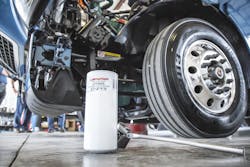A fact of life for the maintenance manager of any heavy duty fleet is to set and keep a schedule for preventive maintenance for the rolling stock, knowing that a well-maintained fleet will maximize its time on road and minimize the idle time spent in maintenance bays. An aid to setting maintenance schedules are the heavy duty engine OEMs who provide recommendations regarding the inspection and change intervals for all of the critical components that help power and protect the engine.
From there, however, it gets tricky. While the engine OEM might suggest the proper change interval for a fuel filter, for example, the task of identifying and implementing the best fuel filter for the job is left to the fleet.
Today, there are many variables to consider when choosing fuel filters. One of the most important is the type of fuel that is powering the engine.
In recent years, biodiesel and ultra low sulfur diesel (ULSD) have become more prominent. Specific to ULSD, it requires fuel additives to help with lubrication of the fuel system components, which was previously provided by the higher sulfur content in the fuel.
Additionally, the presence of water in biodiesel can lead to microbial growth that can compromise the fuel’s performance. Water itself is also damaging to the fuel injectors and other fuel system components and negatively affecting heavy duty engine efficiency and performance with low power output and engine shutdown being common occurrences.
TECHNOLOGICAL DEVELOPMENTS
The increased use of biodiesel and ULSD has prodded fuel filter manufacturers to design next-generation filter technologies that can effectively remove excess water and contaminants from biodiesel and ULSD. One of the latest technological advances in filter media, to be specific, is a micro glass/synthetic laminate that is ultra efficient in removing water and other contaminants like dirt, scale and rust from the fuel before they can harm the fuel injectors and overall fueling system.
The increase in the number and types of fuels that can be used to power heavy duty engines is not the only significant change that has led to the evolution in fuel filter design and performance. Federal agencies, like the U.S. EPA, are constantly revising and tightening the regulations concerning engine efficiency and emissions, which make the fuel filter an even more important component in guaranteeing that heavy duty truck engines are powered by the cleanest fuels and operate at peak efficiency.
Using the cleanest fuel possible is also important because fuel injector clearances have been reduced and injection pressures have been increased over the years to provide improved performance and better combustion, which results in a cleaner-running engine. These changes require the fuel filter to be more efficient at removing particulates from the fuel in order to protect the fuel injectors from damage and keep the engine running at its highest level of performance.
These new-age operational demands have driven fuel filter manufacturers to develop products that can adequately and reliably remove any impurities from the fuel before it is burned, while being compatible with today’s engine designs.
PERFORMANCE
The environmental conditions in which the heavy duty vehicle operates can also affect the performance of the fuel filter. Most fuel filters/water separators work fine until the cold filter plugging point (CFPP) is reached. At this point, the fuel no longer flows through the filter and there is a corresponding increase in the risk that water or moisture will freeze in the filter and break the plastic bowl, and that will send the vehicle to the repair shop.
Attaining the highest level of fuel purity is even more important during the cold weather months.
Luber-finer, by way of example, has found a way to overcome the challenges created by today’s fuel recipes, regulatory requirements and severe operating environments with its new MP995 Fuel Filter. It protects the latest Common Rail High-Pressure Fuel Injection Systems by being 99.5 percent efficient at removing particulates and 95 percent efficient at removing emulsified water from biodiesel.
These filters also help engine OEMs meet federal efficiency and emission regulations, and overcome the challenges in operating in cold weather atmospheres.
Layne Gobrogge is the director of heavy duty marketing and product development for Luber-finer (www.Luber-finer.com), a global brand leader of filter products for heavy duty on-highway vehicles, vocational vehicles and off-road equipment.
